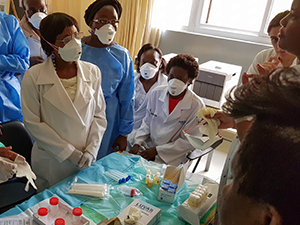GeneXpert Training Strengthens Angola’s Capacity to Diagnose and Treat Tuberculosis
GeneXpert Training Strengthens Angola’s Capacity to Diagnose and Treat Tuberculosis
From January 30 to February 7, 2018, Angola’s Health for All (HFA) Project, supported by the U.S. Agency for International Development (USAID), welcomed global health expert, Dr. Alaine Nyaruhirira, for a week-long training on the use of GeneXpert – technology that has become a game-changer in the fight against tuberculosis (TB).
Angola is one of the countries with the highest TB burden in Africa and among the 22 high-TB burden countries in the world. Strengthening the capacity to diagnose TB and drug-resistant TB (DR-TB) is a priority for effective TB control. Early TB detection and diagnosis is of particular importance for people living with HIV, as TB is the leading cause of death among people living with HIV. According to UNAIDS, 17 percent of people living with HIV in Angola also have active TB.

MSH, through the HFA Project and in collaboration with Angola’s National Tuberculosis Control Program, the National Institute of Public Health, and AFENET organized a hands-on training for staff from government programs and hospitals, including clinicians, nurses, and laboratory technicians. Facilitated by Dr. Nyaruhirira, recognized TB expert and Senior Laboratory Advisor for MSH, the training focused on the strategic and effective implementation of GeneXpert, which has revolutionized the diagnosis of TB and DR-TB by its effectiveness in detecting the bacteria and its resistance to antibiotics in less than two hours, without the need for sophisticated laboratories.
Through the HFA Project, USAID supports the expansion of Angola’s diagnostic capacity in three sites across the capital city of Luanda, where the HIV and TB burden is highest: Viana, Kilamba Kiaxi, and Esperança. The installation of three additional GeneXpert machines expands the government’s network of 12 GeneXpert machines supported by Global Fund, strengthening the nation’s fight against TB and DR-TB. The training builds the capacity of health workers to ensure that patients are quickly and accurately diagnosed and can begin treatment for TB on the day they are diagnosed, reducing the risk of transmission and decreasing the rate of ineffective treatment.
USAID’s HFA Project (Saúde Para Todos) is a five-year project led by Population Services International (PSI) and implemented in partnership with MSH. The project will establish a sustainable model for providing high-quality HIV and AIDS services through the prevention, care, and treatment continuum.